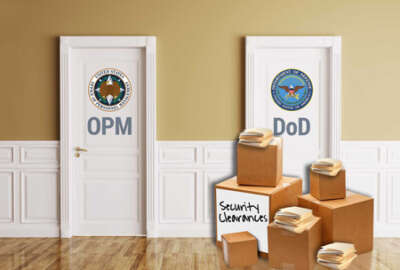
Air Force has 79,000 waiting for security clearances, working with OPM on remedies
The Air Force is suggesting doing security clearance interviews by Skype to speed up the process.
The security clearance process for the intelligence community and the military has been a continual headache over the last few years.
But for the Air Force it’s getting even worse. Air Force Secretary Heather Wilson says the service has 79,000 people still waiting for security clearances and that number has almost doubled in the last 18 months.
“Our biggest challenge with security clearances is getting them through it in the first place,” Wilson told the House Defense Appropriations Subcommittee on March 14.
The Air Force is now trying to work with the Office of Personnel Management and the newly formed National Background Investigations Bureau (NBIB) to speed up the process.
“We don’t do the security clearance background checks ourselves, there’s a process through the Office of Personnel Management and the backlog has gone up from 48,000 to 79,000 in the Air Force,” Wilson said. “We are partnering with them and putting in hubs for the interviews, we’ve asked them to change their processes to be able to do interviews over Skype rather than person to person. It’s a major issue for all of the services.”
The security clearance backlog is a particular problem for the Air Force, which is trying recruit more cyber experts to its force. Most of those billets need security clearances.
Both the Army and the Navy have direct commissioning for cyber experts, but even if someone starts at a higher rank he or she still can’t perform fully without a security clearance.
The Air Force has a commissioning program that moves cyber experts from enlisted to officer status, but at this point does not have a direct commissioning program like the Army and Navy.
The total OPM security clearance backlog stands at more than 700,000. It currently takes about 500 days to get a top secret clearance and 260 days to get a secret clearance.
Since about 75 percent of security clearances have to do with Defense Department jobs, Congress tried to speed up the security clearance process by giving DoD authority over its own security clearance process in the 2018 defense authorization act.
DoD has a plan to implement the congressional mandate in a three-phased approach over three years.
“This approach would allow [the Defense Security Service (DSS)] to begin making an impact on the NBIB backlog of DoD investigations while building investigative capacity, developing automated and streamlined solutions and examining transformational changes to the [background investigation] process,” the plan states. “By the end of phase three, DSS would be responsible for the end-to-end processing of all [background investigations] required for DoD-affiliated individuals.”
Critics of the plan worry DoD is not prepared to take over the process and just adds to the growing list of responsibilities the Pentagon oversees.
Merton Miller, the former deputy director of NBIB, and former associate director for OPM’s Federal Investigative Services, said the transition would be messy and take too much time.
“That’s three more years of doubt that the federal government is going to be experiencing within the background investigative program. If I was working as the deputy director of NBIB now and I’m onboarding resources, knowing that DoD is going to take over in three years, I’m going to focus on the other [non-DoD clearances.] I’m going to focus on the customers I’m going to have long-term … You can’t take three years to effectively transition this program. You can, but it won’t be done the right way,” Miller said. “Three years is a long time. When has any plan lasted three years and been done right? The contractors are going to be in doubt as to who they are going to be working for in the future. Are they going to throw all their eggs in the DoD basket? Are they going to shortchange OPM on the resources they need?”
Copyright © 2025 Federal News Network. All rights reserved. This website is not intended for users located within the European Economic Area.
Scott Maucione is a defense reporter for Federal News Network and reports on human capital, workforce and the Defense Department at-large.
Follow @smaucioneWFED





